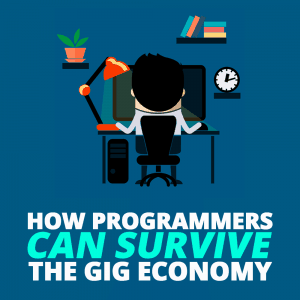
In America, the gig economy workforce rose from 10.1 percent in 2005 to 15.8 percent in 2015. In the same decade, the number of self-employed individuals rose over 19 percent. Whether or not relying on freelance jobs is the choice of the individual, work is hard to find without freelancing, and will continue to grow more difficult.
Businesses like Uber, Lyft, Airbnb, Etsy, and others are driving forces in the gig economy. The common thread between these companies is their ties to technology. They're all built on and kept afloat by the ease in which consumers use technology in their daily lives, making the attention span of the customer and the working span of the employee short.
Gigs have become most popular in technology-based work, such as programming.
Gigs Are Good for Companies
Companies do benefit from having loyal employees, but not all jobs require the same amount of attention. For instance, an architect may be hired by a company to erect a warehouse, but the company wouldn't keep the architect once the work was done. Both sides agree the job is temporary and set payment based on what the work requires, even for important jobs.
In the world of programming, it’s much the same. Highly skilled programmers live all over the world and may only be needed for very specific work. With communications reaching around the globe, a company can hire any programmer they can afford for the job.
There are companies out there leading the charge in ensuring programming isn't solely a freelance career, though. Companies that market software, like Google, Microsoft, and Spotify, will always need programmers of some form in their business. Meanwhile, companies with software as a side product, like Walmart, Boeing, and Ford, require programmers to keep supporting production.
However, many programmers will have to do freelance work, at least to get started in their careers. This is not a dooming aspect. After all, working freelance has its perks, and it can be very rewarding for a budding career.
Gigs Are Good for Programmers
There are many benefits of working a freelance job. Most of them include working from home and at your own pace. Scheduling them right and taking multiple jobs at once can lead you to have a fat bank account. There are obvious downsides, too, such as no retirement plans or health coverage, but those can always be worked out in the future.
For programmers specifically, some companies offer their contracted employees benefits: Uber offers signing bonuses and phone plan discounts. Some companies even offer partial insurance coverage, though it’s likely as temporary as the job.
Working gigs for various companies also may allow some job security. You won’t lose your entire income if your company is negatively affected by the Great Recession or goes bankrupt. Risk management can be strategized too, allowing workers to avoid a layoff and choose who they want to work for.
Even when working remotely and at their own pace, programmers can produce the same high-quality products as if they were in office. A stress-free environment can even have a direct hand in the kind of work being done, and freelancers can become more confident in their work.
Even taxes can be worked out at the end of the fiscal year. Freelancers of any kind are small-business owners, running a one-person company contracted out to larger firms. There are federal tax breaks for people in these positions, as well.
The Gig Economy Grows
In America, the gig economy is consistently growing. However, the global trend shows no sign of slowing down either. According to Intuit and Emergent Research, the number of people working gig jobs in America is predicted to rise from 3.9 million in 2016 to 9.2 million in 2021.
With a projected 9.2 million Americans in 2021 working on-demand jobs, the government won't be able to handle the load. This is where steps are taken to protect the freelancers by providing better benefits with freelance work or creating more full-time jobs in these fields, like programming.
The gig economy is here to stay in one form or another. Whether the predicted growth will be accurate or not remains to be seen by what the global economy and job market does soon. As of now, benefits for contracted laborers is a rising trend.
Not All Bad
There are outdated social expectations for finding a full-time local job that may drag you down mentally, but you don't have to go by the old norms. The world's changing with growing technology, and the goal is to make enough money to keep going.
Surviving in the gig economy is possible, but thriving can be another can of worms. Being a successful freelancer can happen with enough work put in, and all those jobs look great on a resume, if you ever feel like making the move into the office.
